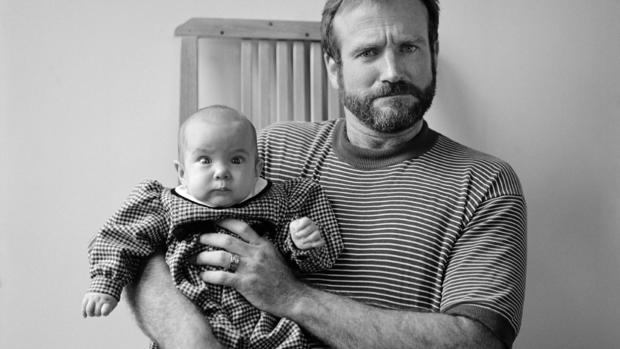Robin Williams' widow on his fight against the "terrorist" inside his brain
Just over two years ago, America lost one of its most beloved actors. Robin Williams left us with many laughs and memorable characters when he took his own life in August 2014.
Despite his larger-than-life spirit onscreen, Williams had several private struggles. His widow, Susan Schneider Williams, who is on the board of directors at the American Brain Foundation, wrote about her husband’s final year in an editorial for the journal “Neurology” entitled “The terrorist inside my husband’s brain.”
Contrary to public perception, Schneider Williams said the cause of her husband’s death was not solely depression. While it was one of his symptoms, she said it was not a “predominant” one, and “there was so much more going on.”
Schneider Williams explains it was Lewy body dementia that drove her husband to suicide. Lewy body dementia affects nearly 1.5 million people in the U.S., and with over 40 possible symptoms – including hallucinations, muscle stiffness, confusion and loss of memory – the condition is hard to diagnose.
In her first TV interview since writing about her husband’s struggles, Schneider Williams told “CBS This Morning” Wednesday that she first knew there was a problem when Robin experienced gut discomfort during the celebration of their second wedding anniversary in 2013. They initially thought it could be diverticulitis, but tests proved negative.
“It turned out to be nothing,” she said. But his response to it was “alarming.”
“Robin and I had been together six years to that point and I knew my husband’s normal baseline of fear and anxiety. And his fear and anxiety spiked and sustained at a level that was very scary,” Schneider Williams said. “So that was kind of the beginning, really the way I see it. And the next 10 months, we were chasing symptom after symptom.”
- Robin Williams' daughter Zelda posts touching Instagram about depression
- Robin Williams remembered one year later
The second-most common type of dementia, Lewy body has some symptoms in common with Parkinson’s disease and Alzheimer’s. But unlike the latter, the individual is “aware of their disintegration” and knows that their “abilities are declining.”
“How much of it is physical pain?” co-host Charlie Rose asked.
“I don’t know,” Schneider Williams said. “I can tell you in his autopsy, the coroner’s report was clear that he had Lewy body throughout all of his brain and brain stem – nearly every region.”
She said that her husband had mounting fears and anxiety.
“It got difficult for him to even – even interacting with people became very difficult. He would question things afterwards or during ... in the realms of, ‘Did I do OK?’ Things that focused around insecurity and fear,” she explained.
A few months before he died, they thought they had found the answer to his battles when he was diagnosed with Parkinson’s.
“Which is actually an accurate diagnosis; however, that was the clinical side. The pathology was that he had diffuse Lewy body disease, which is what took him,” Susan said.
While Schneider Williams felt relief to know a possible cause, Robin had more questions for the doctor, asking if he had Alzheimer’s, dementia, or schizophrenia.
“It was painful later to realize why he was probably asking these questions, because he was getting a lot of the – not necessarily symptoms but the degree of symptoms to himself.”
One in six Americans are affected by brain disease. Schneider Williams said the caregiver is the “ultimate key witness to the terrorism that they are experiencing their loved one go through.”
And she shared a message for other caregivers.
“They’re not alone, and also to remember – and it’s hard to hold onto this – but to remember that their loved ones’ symptoms are coming from the diseases. It’s not coming from their heart,” she said.
